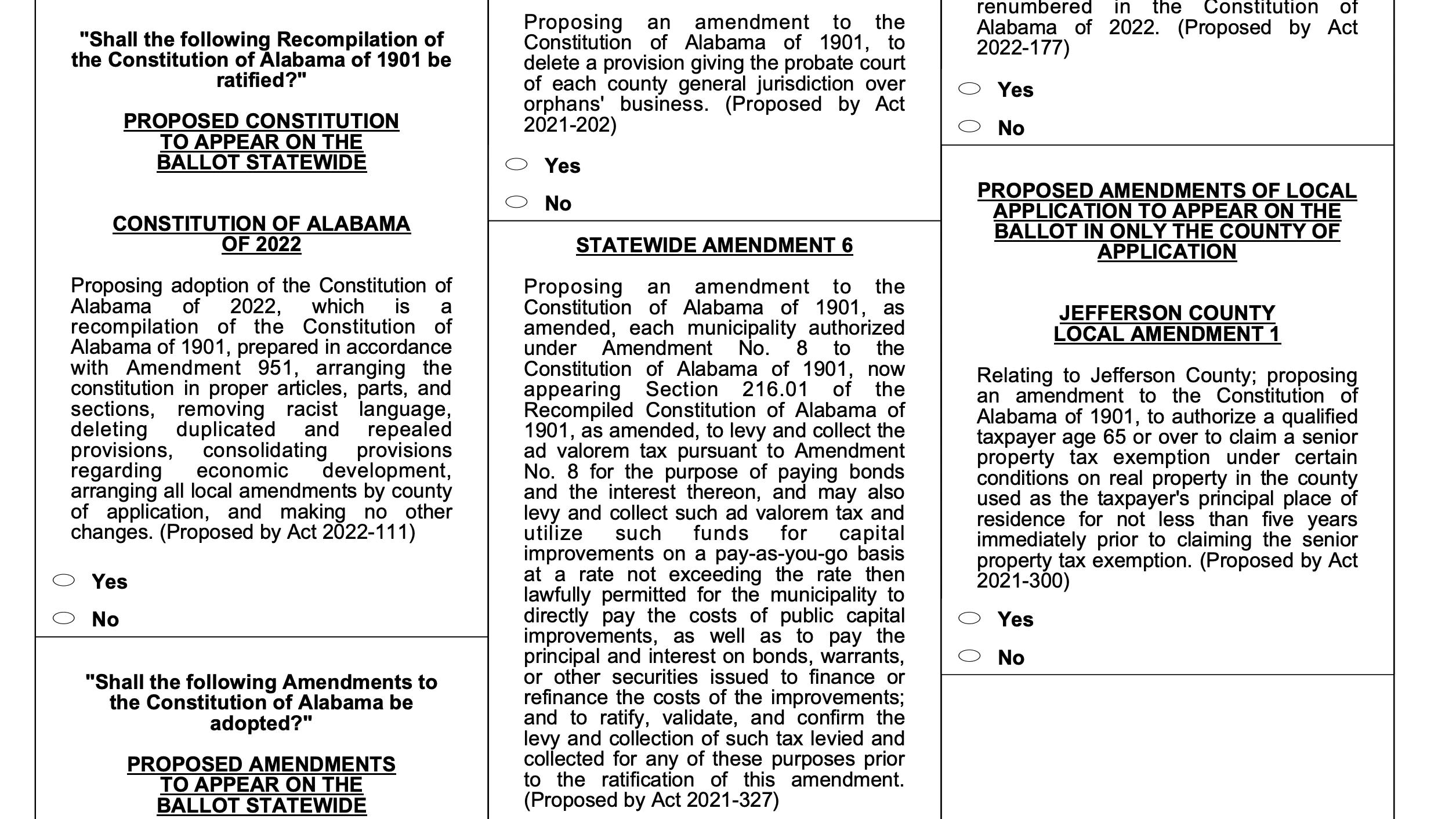|
Getting your Trinity Audio player ready...
|
With most of the statewide races seemingly being decided, voters still have a reason to come out to the polls on Election Day: to vote on 10 amendments and a constitutional proposal that seek to change and update the Alabama Constitution.
Here’s what the amendments set out to do.
Removing racist language and reorganizing the constitution
A proposal to recompile the Alabama Constitution into the Constitution of Alabama of 2022 would remove racist language and reorganize the governing document, which is among the longest in the world with nearly a thousand amendments.
It would remove language allowing for slavery as a punishment for crime and language allowing children to attend schools of their own race to preserve “peace and order.”
In addition to addressing the racist language, the recompilation would also reorganize the Constitution by topic and reorganize local amendments by county.
Expanding broadband and the power of local government
Three of the ten amendments at the polls deal with the ability of local governments to recruit economic development.
Amendment 2 would allow counties to use federal funds from the American Rescue Plan Act as incentives to recruit broadband to build in their communities.
Under Section 94 of the Alabama Constitution, counties are prohibited from offering a “thing of value” to an individual or corporation.
The state announced last month it’s “middle mile” program using ARPA funding to connect 3,000 miles of broadband infrastructure across the state. But since some ARPA funding went directly to counties, this amendment is necessary to allow counties to unlock those federal funds for broadband expansion.
The amendment would only allow a county government to offer federal money to a public or private entity for the purpose of expanding broadband infrastructure.
Amendment 7 clarifies other language regarding the recruitment of economic development by county government. Amendment 772 of the Alabama Constitution provides a framework for every Alabama county to court businesses, but 14 counties were already covered under a previous amendment (759), causing those counties to have to get approval from a judge to borrow money from public-private partnerships.
Amendment 7 would make it clear that all counties fall under Amendment 772 provisions, eliminating that extra step for affected counties.
Amendment 6 would allow cities to use ad valorem taxes to fund capital projects and repay bonds. An early amendment of the Alabama Constitution requires about 40 municipalities in the state to spend that revenue to pay off debt. Amendment 6 would resolve that old restriction and allow cities such as Huntsville and Birmingham to pay for projects wihtout borrowing money.
Denying bail and notification of commutation
Two amendments seek to make changes regarding incarcerated individuals.
Amendment 1 would allow judges to deny bail to a person charged with a violent felony following a hearing. Under current Alabama law, bond can only be revoked for capital offenses. Under this amendment, that power would be extended to 13 first-degree offenses, including murder; assault; kidnapping; rape; sodomy; domestic violence; human trafficking; burglary; arson; robbery; sexual torture; terrorism and aggravated child abuse.
The law has been dubbed “Aniah’s law,” referencing Aniaha Blanchard, who was abducted in Auburn and killed in 2019. Ibrahim Yazeed, who has been charged with the murder, was out on bond for holding two men at gunpoint at the time of Blanchard’s death.
Amendment 3 would limit the governor’s power of commuting a death sentence to life in prison, requiring the governor to notify the attorney general and make reasonable effort to contact the victim’s family. Failure to notify would make the commutation void under the law.
The amendment was requested by the family of Lisa Ann Millican, a 13-year-old girl raped and murdered by Judith Ann Neeley in 1982. Gov. Fob James in 1999 commuted Neeley’s sentence to life in prison.
However, no Alabama governor has commuted a death sentence to life imprisonment since.
Everything else
Amendment 4 would require any election law passed by the legislature to have an effective date at least six months before an election. The bill would put a deadline on the Legislature to pass election laws during Presidential election years.
Amendment 5 removes language giving probate judges power over “orphans’ business.”
The change was requested by Alabama Law Institute, which says the language is outdated in relation to how juvenile legal matters are handled. Probate judges would still handle adoptions and guardianship matters.
Amendment 8 and Amendment 9 both deal with bringing private sewer systems under public regulation for a time in response to concerns about high fees.
Amendment 8 would bring some privately-owned sewer systems under the control of the Public Service Commission and Amendment 9 would give the PSC authority to regulate private sewer systems in Lake View for four years.
Amendment 10 would bring all the amendments passed on this ballot into the Constitution as recompiled, if the constitutional proposal is passed, instead of adding them onto the end.
You can find sample ballots by your county here.
















































